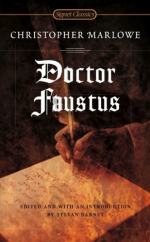|
This section contains 4,057 words (approx. 14 pages at 300 words per page) |

|
SOURCE: "Faustus's Rhetoric of Aspiration," in Marlowe's Dr. Faustus and Tamburlaine: Theological and Theatrical Perspectives, Verlag Peter Lang GmbH, 1984. Reprinted in Christopher Marlowe's "Doctor Faustus," edited by Harold Bloom, Chelsea House, 1988, pp. 93-103.
In the following excerpt, Birringer examines Doctor Faustus in terms of the protagonist's struggle against the limits of language, of theology, and of his personality.
The theatrical presentations of the Scenes on which Faustus and Macbeth are going to act out their fatal transgressions quite distinctively create a sense of atmosphere that shapes the audience's perception of the emotions at work in the play-in-performance. Those emotions not only operate in the dramatic universe itself, but also on the spectator-as-participant. In terms of this "structure of feeling" … the atmospheric effects in Macbeth interpenetrate the fragmentary, visual presentation of individual characters. The element of the fantastical, the insubstantial, and the unreal pervade the fabric of the play...
|
This section contains 4,057 words (approx. 14 pages at 300 words per page) |

|


